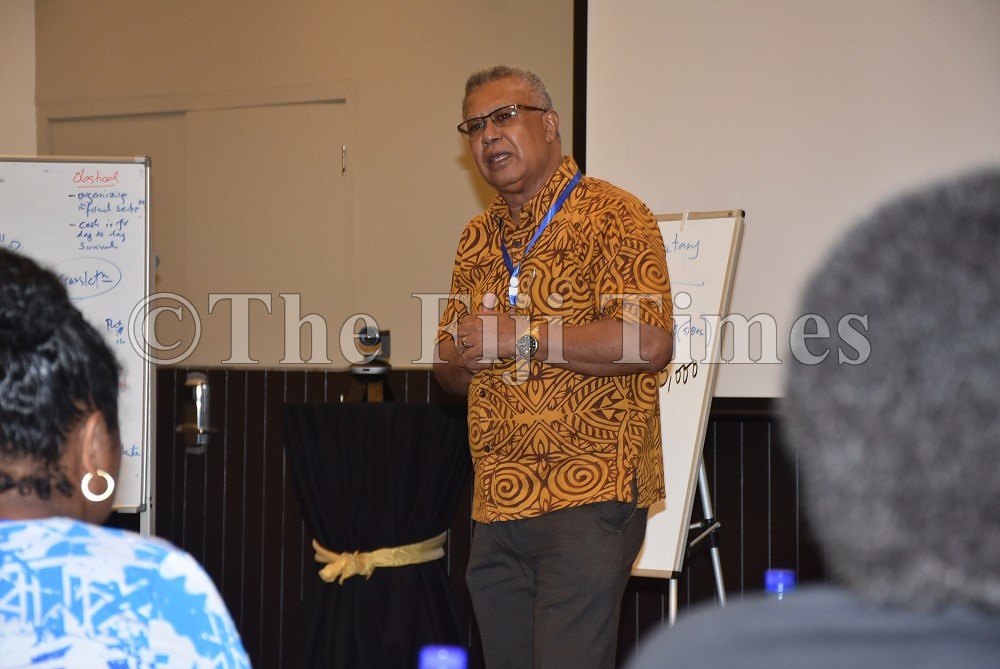THE informal sector has grown significantly over the past 10 months caused by the economic impact of the COVID-19 global pandemic.
In Fiji, many of those employed in the tourism and aviation industry saw their lives completely changed with many joining the informal sector through microbusinesses and agro farming with the aim to become entrepreneurs and economically self-sustainable.
International Labour Organisation project manager Edward Bernard said after a rapid assessment by ILO focusing on the impact of COVID on employment and livelihoods, they found that there was a large shift of workers into the informal sector.

“Before COVID, the informal sector workers made up 66.2 per cent of total workers so that number was already big,” he said.
“So when workers in the formal sector lost their jobs and moved to the informal sector, it would inflate the sector to about 80 to 90 per cent.”
He said as a result of this large shift, the ILO with development partners; the United Nations United Nations Educational, Scientific and Cultural Organisation (UNESCO), United Nations Development Programme (UNDP) and the International Fund for Agricultural Development (IFAD), a new project was developed to support those in the informal sector.
“This project provides support in three ways, one is in terms of business development services such as how to give them business training, business mentoring and how to give them business advisory services
. “If you go out to VotCity right now you will find a lot of people who were flight attendants and who worked for the airline who have got microbusinesses. “If you ask a majority of them if they ever had training, they would say no.
“So you see they are at risk of their business failing and risk of income so this project tries to provide that support for them.”
Apart from joining the agriculture and microbusiness industry, the former formal employees have also tapped into the creative industry market setting up businesses that take advantage of their natural talents.
Fiji Arts Council project co-ordinator Elizabeth Edwards said despite COVID-19, the industry had been thriving.

“We still have weddings, funerals and gatherings that people seek out our members for items they create,” she said
. “It’s an industry that’s been there from our ancestors time until now and we have seen a lot more people who were employed in the tourism sector taking up mat weaving, masi making and even creating various crafts that they are now selling.
“Recently we had an arts exhibition in Suva and we had 63 entries to the exhibition and from the West we saw entries from former security guards and those who were currently out of work but they had that natural talent.
“The 63 entries were the highest that we had so you can see that during COVID everybody was in lockdown but still practising their art.”
One such artist whose business flourished despite the challenges of COVID was Josaia Mataiwai who set up his own creative arts business LeNiu Art.

“When COVID hit I can honestly say my biggest market was the locals,” he said.
“When I released my line two weeks ago, my biggest market was the locals overseas.
“Digital platforms also became a very important marketing point that a lot of my buyers used to make contact with me and I believe that is where people are going to sell their products.”
Ms Edwards explained that the creative arts industry has become a necessary source of income over the past couple of months with the new microbusiness entrepreneurs taking advantage of digital platforms.
She adds another institution that the informal sector employees have to consider was the Fiji National Provident Fund.
FNPF member services general manager Alipate Waqairawai explained that the fund was stepping its membership drive for the informal sector under their Voluntary Membership Scheme.
“What we are trying to do is make it easier for those in the informal sector to join FNPF,” he said.
“One of the biggest challenges in the informal sector and for voluntary members is the ease with which they can contribute
to FNPF.
“So the whole purpose of the workshop today is to see how we can collaborate with our stakeholders to find solutions to address
this.
“We can take advantage of the digital platforms that are out there and also find new channels of doing business.
“How can we make it in such a way that it is user-friendly for the member that is also effortless, less time consuming and is
not costly for the member.”






